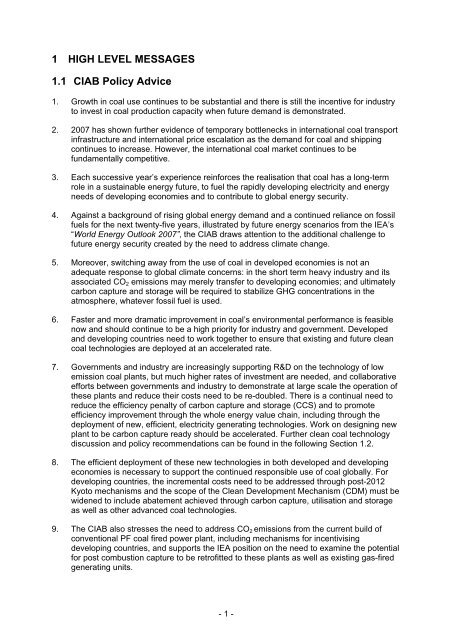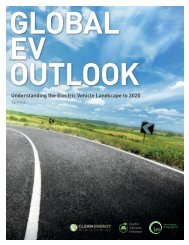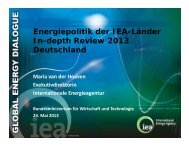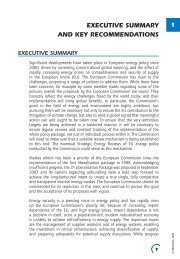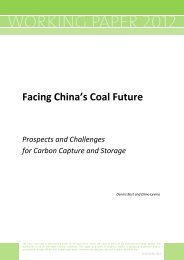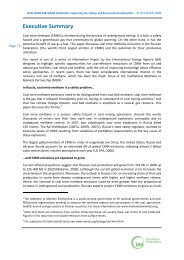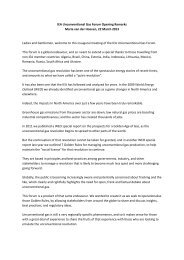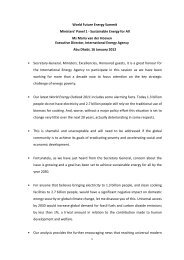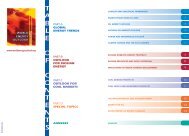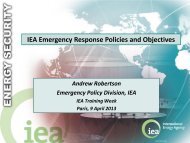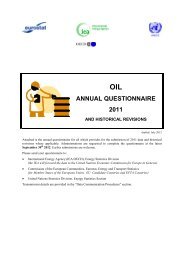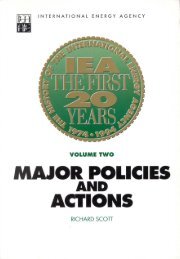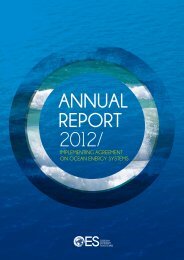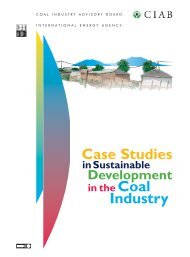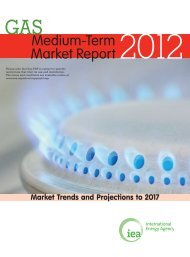CIAB Market & Policy developments 2005/06 - IEA
CIAB Market & Policy developments 2005/06 - IEA
CIAB Market & Policy developments 2005/06 - IEA
Create successful ePaper yourself
Turn your PDF publications into a flip-book with our unique Google optimized e-Paper software.
1 HIGH LEVEL MESSAGES<br />
1.1 <strong>CIAB</strong> <strong>Policy</strong> Advice<br />
1. Growth in coal use continues to be substantial and there is still the incentive for industry<br />
to invest in coal production capacity when future demand is demonstrated.<br />
2. 2007 has shown further evidence of temporary bottlenecks in international coal transport<br />
infrastructure and international price escalation as the demand for coal and shipping<br />
continues to increase. However, the international coal market continues to be<br />
fundamentally competitive.<br />
3. Each successive year’s experience reinforces the realisation that coal has a long-term<br />
role in a sustainable energy future, to fuel the rapidly developing electricity and energy<br />
needs of developing economies and to contribute to global energy security.<br />
4. Against a background of rising global energy demand and a continued reliance on fossil<br />
fuels for the next twenty-five years, illustrated by future energy scenarios from the <strong>IEA</strong>’s<br />
“World Energy Outlook 2007”, the <strong>CIAB</strong> draws attention to the additional challenge to<br />
future energy security created by the need to address climate change.<br />
5. Moreover, switching away from the use of coal in developed economies is not an<br />
adequate response to global climate concerns: in the short term heavy industry and its<br />
associated CO 2 emissions may merely transfer to developing economies; and ultimately<br />
carbon capture and storage will be required to stabilize GHG concentrations in the<br />
atmosphere, whatever fossil fuel is used.<br />
6. Faster and more dramatic improvement in coal’s environmental performance is feasible<br />
now and should continue to be a high priority for industry and government. Developed<br />
and developing countries need to work together to ensure that existing and future clean<br />
coal technologies are deployed at an accelerated rate.<br />
7. Governments and industry are increasingly supporting R&D on the technology of low<br />
emission coal plants, but much higher rates of investment are needed, and collaborative<br />
efforts between governments and industry to demonstrate at large scale the operation of<br />
these plants and reduce their costs need to be re-doubled. There is a continual need to<br />
reduce the efficiency penalty of carbon capture and storage (CCS) and to promote<br />
efficiency improvement through the whole energy value chain, including through the<br />
deployment of new, efficient, electricity generating technologies. Work on designing new<br />
plant to be carbon capture ready should be accelerated. Further clean coal technology<br />
discussion and policy recommendations can be found in the following Section 1.2.<br />
8. The efficient deployment of these new technologies in both developed and developing<br />
economies is necessary to support the continued responsible use of coal globally. For<br />
developing countries, the incremental costs need to be addressed through post-2012<br />
Kyoto mechanisms and the scope of the Clean Development Mechanism (CDM) must be<br />
widened to include abatement achieved through carbon capture, utilisation and storage<br />
as well as other advanced coal technologies.<br />
9. The <strong>CIAB</strong> also stresses the need to address CO 2 emissions from the current build of<br />
conventional PF coal fired power plant, including mechanisms for incentivising<br />
developing countries, and supports the <strong>IEA</strong> position on the need to examine the potential<br />
for post combustion capture to be retrofitted to these plants as well as existing gas-fired<br />
generating units.<br />
- 1 -


